Labor unions have been gaining ground under President Obama, helping to stabilize their previously declining membership at 11.1 percent of the workforce. Through the National Labor Relations Board, the Obama administration has issued numerous changes in labor law to make workplace organizing easier in a bid to boost union power.
The board, which is the main federal labor law enforcement agency, has sped up the scheduling of workplace votes, made it harder for employers to respond to union claims and limited their ability to register objections with the board. It also has required employers to turn all employee contact information to unions. Employees who want that information to be kept private have no say in the matter.
In an effort to beat back those efforts to make unionizing easier, Republican lawmakers have introduced the Employee Rights Act. Presidential candidates still in the race for the White House seem to be studiously avoiding commenting on where they stand on the legislation, although it is evident from their past words and actions that Ted Cruz strongly supports it while Hillary Clinton and Bernie Sanders oppose it entirely.
Donald Trump’s and John Kasich’s positions are harder to discern from their records, and neither is willing to say which way, as president, they would jump on this key piece of legislation on worker rights and union power.
The legislation would amend the National Labor Relations Act to require that all workplace organizing elections be federally monitored secret ballot votes, even if the employer has not called for one. That would rule out so-called “card check” elections, where the employer has to accept at face value the union’s claim to have majority worker support.
The measure was introduced in response to labor’s unsuccessful push for card check legislation after Obama’s re-election in 2012. Union leaders wanted Congress to eliminate an employer’s ability to request a federally monitored election to verify a union’s claim of majority support. Unions are organized by what amount to signed petition drives, with all of the voting done in public and no way to verify the union’s claims of support. The legislation fizzled in Congress after moderate Democrats balked.
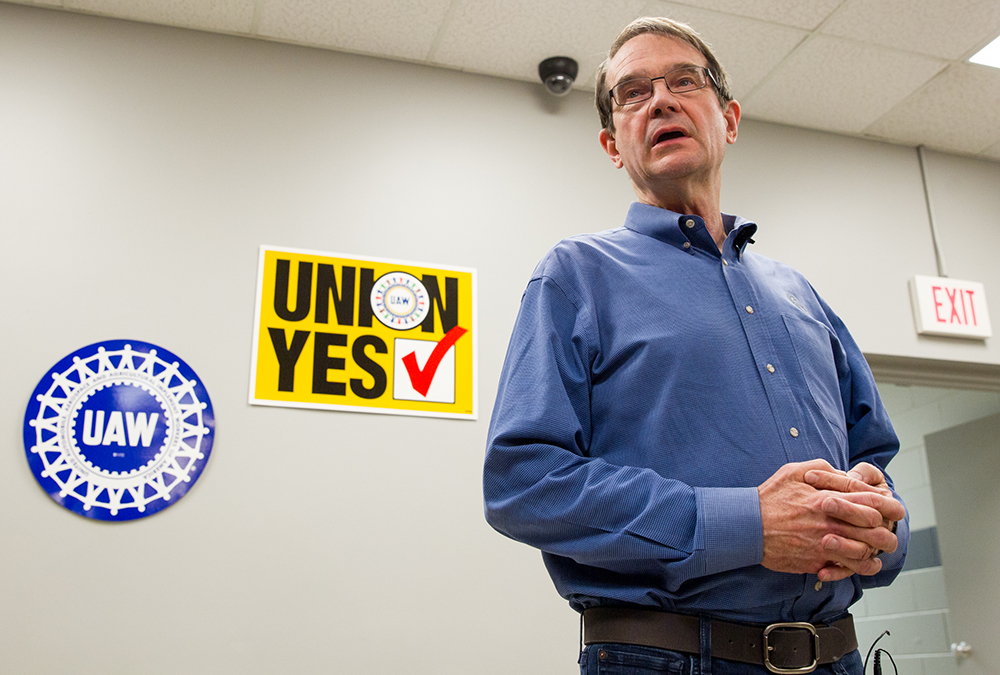
The legislation would amend the National Labor Relations Act to require that all workplace organizing elections be federally monitored secret ballot votes, even if the employer has not called for one. (AP)
In addition to prohibiting card check, the Employee Rights Act would further require that unions win a majority of all workers, not just a majority of the votes cast in the election. Currently, a union can win even if only a tiny fraction of workers participates, as long as the union gets a majority of them.
The legislation also would eliminate a requirement that employers give away worker phone numbers and email addresses to unions even if the worker objects to that, criminalize threatening workers during an election and require two weeks notice before the NLRB holds a hearing on a union’s request for recognition. Any disputes over issues such as which workers are eligible to vote would have to be resolved before any election, not after the fact, the current practice.
Existing unions would be prohibited from using dues for items other than collective bargaining without the worker’s written consent. To ensure compliance, unions would have to submit to periodic audits and make the information available to members.
Finally, once more than half of a union organized staff has left that place of work, the union would be obliged under the act to hold a new election to ensure a majority of workers still wanted it.
The most recent version of the bill was introduced in July by Sen. Orrin Hatch, R-Utah, and Rep. Tom Price, R-Ga. The House version has 89 co-sponsors and the Senate version has 28. Both bills are stalled in committee.
The next president will have the most direct impact over labor policy through the National Labor Relations Board, since the White House nominates the five-member board’s majority. The president won’t be able to do that immediately, though, since the members serve staggered, multiyear terms.
A quicker litmus test for where the candidates stand on union power will be whether they encourage Congress to pass the Employee Rights Act.
With that in mind, the Washington Examiner took a look at where the remaining presidential hopefuls stand on the legislation and union power in general.
Donald Trump
The front-running Republican candidate has a long, complicated relationship with organized labor, having dealt extensively with unions as a real estate developer and as an owner of hotels and casinos. The service employee union Unite Here represents the workers at New Jersey’s Trump Taj Mahal, for example. Trump himself is a union man, having joined the Screen Actors Guild through his numerous film and TV appearances.
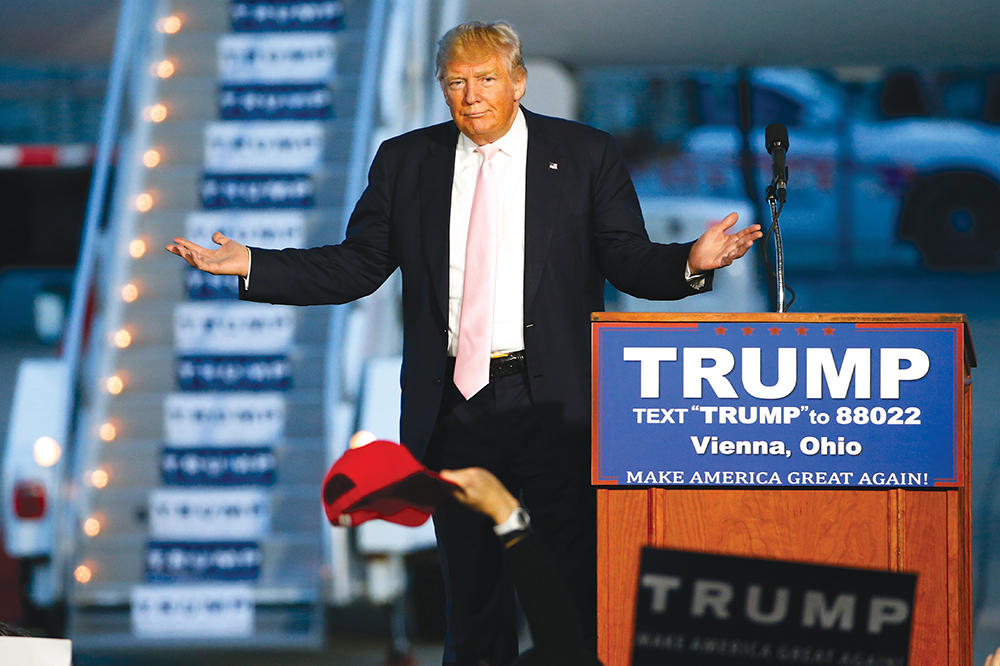
The front-running Republican candidate has a long, complicated relationship with organized labor. (AP)
He at times has praised unions as a force for good. In his 2000 book The America We Deserve, he wrote, “Is Trump a union man? Let me tell you this: Unions still have a place in American society. In fact, with the globalization craze in full heat, unions are about the only force reminding us to remember the American family.”
Former long-time Trump adviser Roger Stone told the Examiner in October, “He’s generally union-friendly. He plays golf with and is friendly with, on a social basis, a number of union leaders in New York City.” Trump was particularly close to the late Ed Malloy, former president of the Building and Construction Trades Council of Greater New York, Stone said.
However, Trump has clashed repeatedly with unions and is fighting an effort by Unite Here to organize the Trump International Hotel in Las Vegas. His lawyers have argued the union was intimidating workers during the vote.
He told a South Carolina radio station in February that he prefers right-to-work states, such as the Palmetto State. “It is better for the people. You are not paying the big fees to the unions …. I like it because it gives great flexibility to the people. It gives great flexibility to the companies,” he said.
Trump’s campaign told the Examiner that it would clarify its position on the Employee Rights Act, but it has not done so, declining to respond to numerous follow-up inquiries.
Ted Cruz
The Texas senator was an original co-sponsor of the Employee Rights Act when it was introduced last year, meaning he supported it from day one. He co-sponsored the legislation in the previous Congress as well.
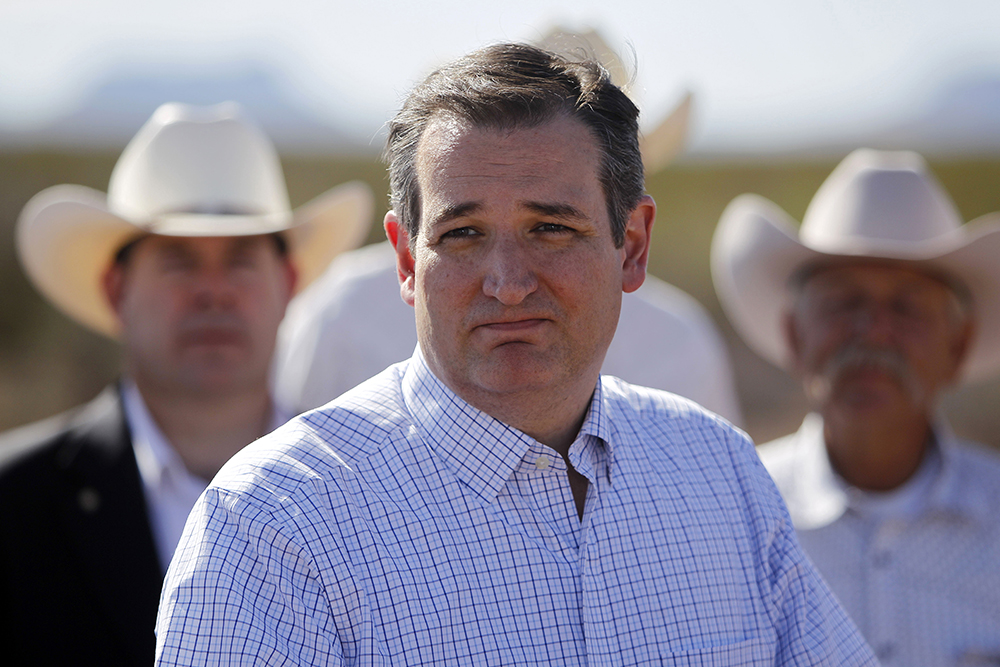
The Texas senator was an original co-sponsor of the Employee Rights Act when it was introduced last year. (AP)
Over the last four years, Cruz has garnered a zero percent lifetime rating from the AFL-CIO labor federation, primarily for opposing increases to the minimum wage and all of President Obama’s nominations to the NLRB, Labor Department and Consumer Financial Protection Bureau.
Labor does not appear to be an issue that the senator spends much time on, though. A Cruz campaign spokesman did not respond to a multiple requests request for comment. Despite co-sponsoring the ERA, he has not issued any statements regarding it.
John Kasich
Like Trump, the Ohio governor has a complicated relationship with unions, as he represents one of the most union-dense states in the nation. Kasich has alternately fought with unions and made peace with them. His campaign did not respond to requests regarding whether he would support the Employee Rights Act.
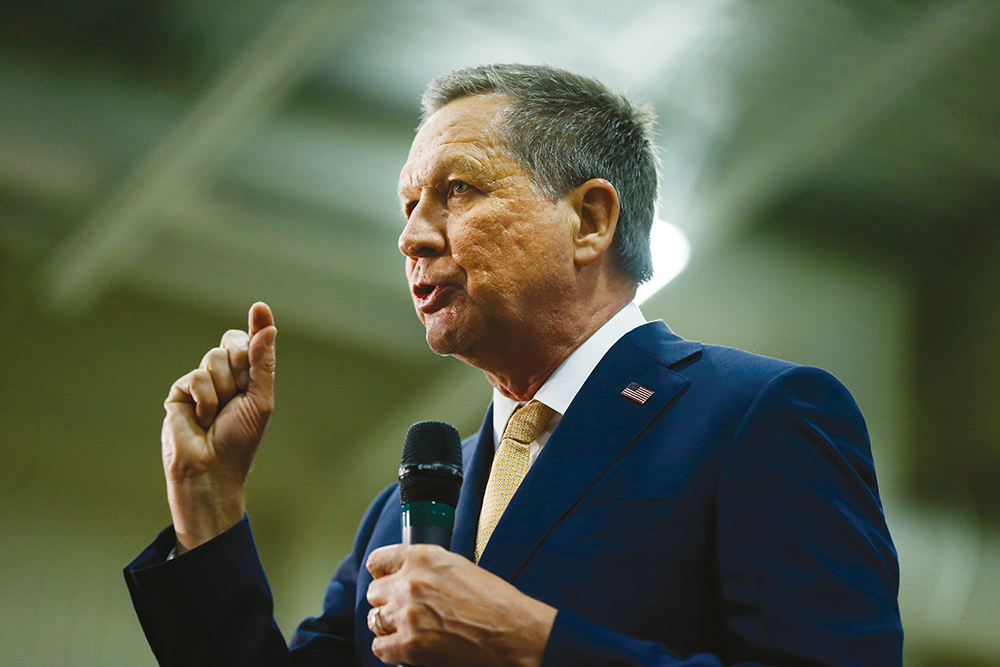
Kasich has alternately fought with unions and made peace with them. (AP)
Kasich’s gubernatorial career began in 2010 with a showdown against public-sector unions over a bill he got through the state legislature that would have required state employees to pay a higher percentage of their pension and healthcare costs as well as outlaw strikes and give school boards more power to fire poorly performing teachers. Labor leaders mounted a successful effort in 2011 to repeal the law through a voter referendum. Kasich subsequently made overtures to unions to bury the hatchet, saying, “The people have spoken.” He received some union backing for his 2014 re-election bid.
“We have gotten to know each other over time,” he told Bloomberg News last year.
Hillary Clinton
Hillary Clinton also has had a rocky relationship with unions over time. She served from 1986 to 1992 on the board of the retail giant Walmart, a nonunion company despised by labor leaders. Many in organized labor still resent President Bill Clinton for signing the North American Free Trade Agreement in 1993, blaming it for subsequent job losses.
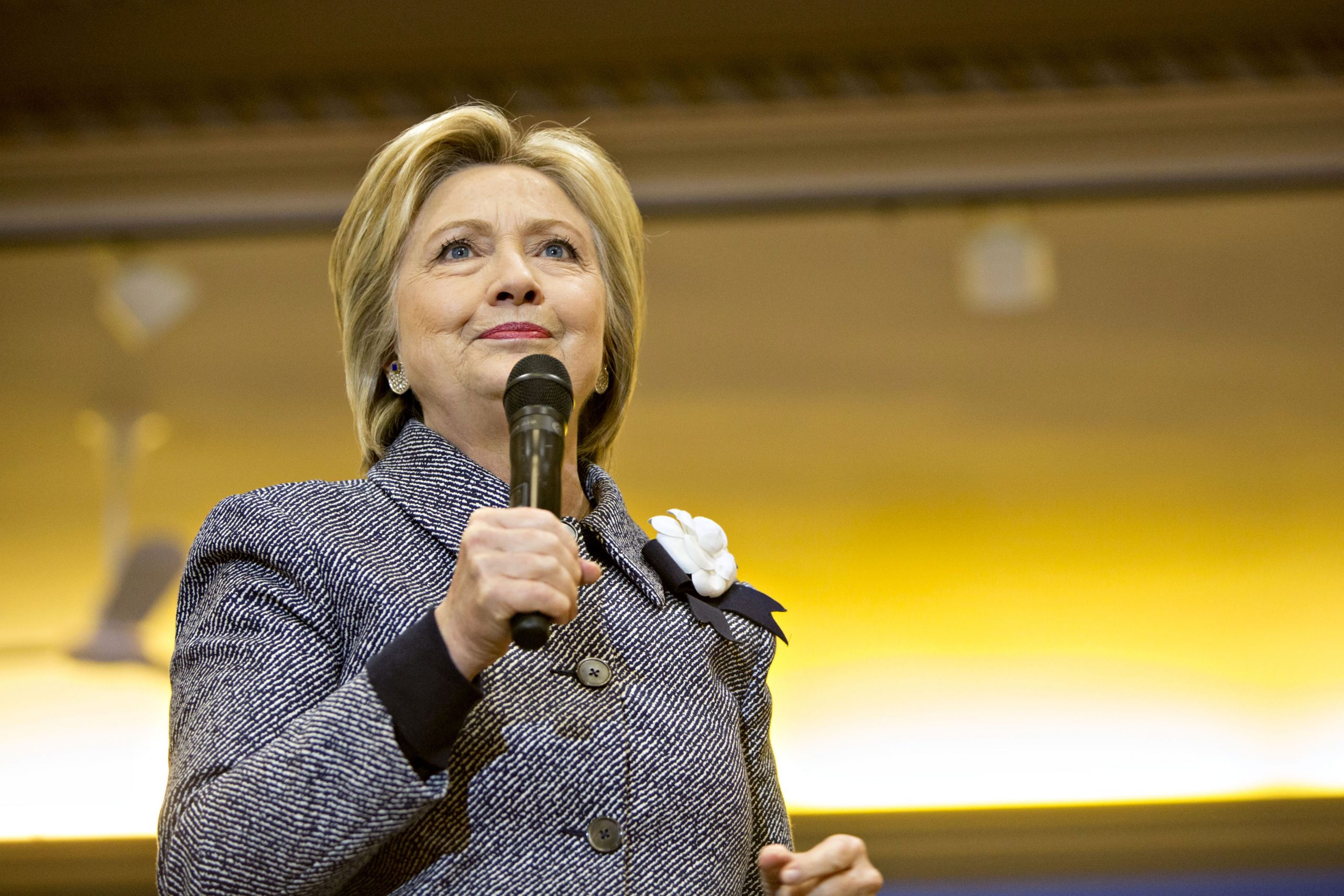
As a New York senator, she was pro-union, with a lifetime AFL-CIO rating of 94 percent. (AP)
As a New York senator, she was pro-union, with a lifetime AFL-CIO rating of 94 percent. She was a co-sponsor in 2007 of the Employee Free Choice Act, the union-backed legislation that would have made card check the norm, the opposite of the Employee Rights Act.
Clinton has aggressively courted unions in her presidential bid, joining them on issues such as opposing the Trans-Pacific Partnership, a proposed 12-nation trade deal negotiated by the Obama administration. She leads all candidates in union endorsements, having won the backing of the Service Employees International Union, the American Federation of State, County and Municipal Employees, the National Education Association, and the American Federation of Teachers, among others. AFT President Randi Weingarten is a personal friend.
Her campaign did not respond to requests regarding whether she would back the Employee Rights Act.
Bernie Sanders
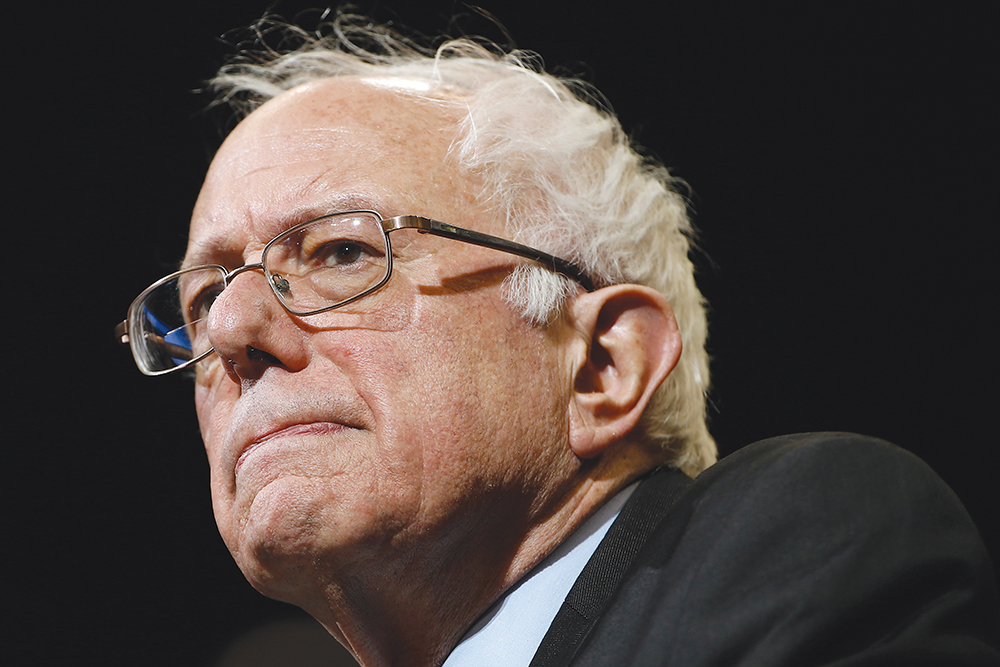
With a 98% rating from the AFL-CIO, Sanders is the most pro-union candidate in the race. (AP)
Though Clinton has the most endorsements, the socialist Vermont senator is actually the most pro-union candidate in the race. Sanders has supported union leaders on every major issue throughout his quarter-century career in Congress and has a 98 percent lifetime rating from the AFL-CIO. His few demerits come from having skipped some votes, such as the 2011 South Korean free trade deal, which labor opposed but the Senate passed overwhelmingly. He was not only a co-sponsor of the Employee Free Choice Act, but he also is sponsoring new Senate pro-card check legislation.
“Our job is to make it easier for workers to join unions, not harder,” Sanders said in an October announcement for the bill.
His campaign also did not respond to a request for comment. Perhaps they thought his position was obvious.
